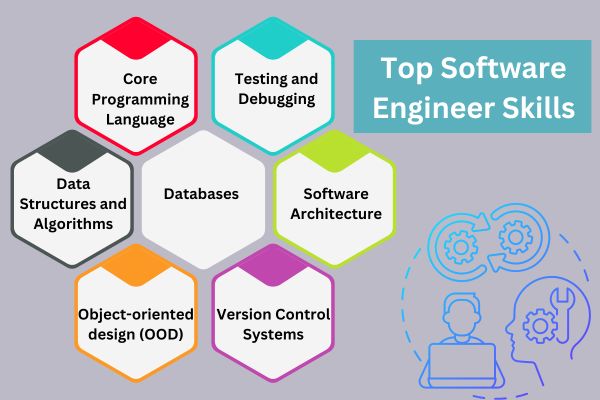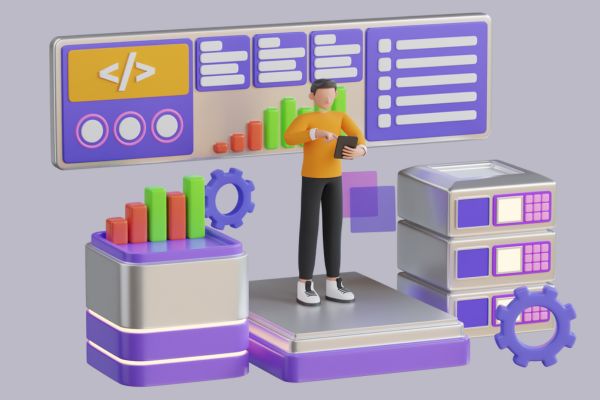Top Software Engineer Skills You Should Have
Software engineering involves a diverse array of responsibilities, spanning project oversight to technical expertise. Employers look for both hard and soft abilities. Chief among the skills sought are proficiency in coding languages, strong problem-solving capabilities, the ability to collaborate well within a team, clear communication skills, and adaptability – reflecting how varied the daily work of a software engineer can be.
From planning and scheduling to troubleshooting bugs, software engineers wear many hats. This article will investigate the top Software Engineer Skills you should have.
What are Software Engineer Skills?
While software developers focus primarily on coding, software engineers take a more well-rounded approach to create effective and efficient software solutions. Their work involves using scientific principles and mathematics to strategize, design, and develop programs.
Throughout each project, engineers wear many hats. They help map out plans and determine the best path forward. During the coding process, they collaborate closely with developers to problem solve and ensure high quality.
Once a system is in place, engineers shift to an evaluative role where they assess performance, identify areas for improvement, and provide technical documentation.
Top Software Engineer Skills:

Software Engineer Skills encompass a wide range of technical and practical capabilities founded in mathematics, computer science, and engineering. Key criteria for hiring a software engineer involve demonstrated proficiency in certain hard talents to guarantee capable execution in the role. These essential abilities consist of strong programming acumen in multiple languages along with problem-solving, debugging, and troubleshooting expertise.
Likewise, collaborative soft talents like communication, teamwork, and project management have become increasingly valuable attributes as software development often involves working closely with others on complex projects.
Evaluation of candidates also assesses adaptability and continual learning since technologies regularly evolve, necessitating engineers to expand their skill sets over time.
1. Core Programming Language
Learning one main programming language well is important. Whether it’s Python, Java, or C++, being great at it allows good talking with computers, creating a base for making software.
2. Testing and Debugging
Testing and fixing problems are very important for software. Careful testing makes software work well, and fixing issues quickly finds and fixes problems. This helps make programs strong without errors.
3. Databases
It is important to understand databases for storing and getting data easily. Being good at SQL or NoSQL databases allows software engineers to make and improve how data is organised for different programs.
4. Software Architecture
Software architecture is how a system is designed overall. It includes decisions on parts, how they connect, and common designs that form a foundation for software that can grow large, be taken care of, and work well.
5. Object-oriented design (OOD)
OOD focuses on separating a program into independent parts called objects. These objects package both data and the functions that work on that data. By splitting a program into objects, OOD makes the program easier to understand, change, and reuse.
Soft Skills Required For Engineering in Software:

In addition to the essential software engineering abilities, there are also numerous software engineering qualifications that are attractive for the role.
Individuals can obtain and cultivate these skills through an assortment of involvements not exclusively associated with software engineering but will assist in routine software engineer duties and make it simpler to fulfil the obligations included.
For instance, strong communication skills allow engineers to efficiently interact with colleagues and clients. Problem-solving expertise helps tackle technical issues that arise during development. Creativity is valuable for envisioning innovative solutions or approaches to challenges. Teamwork and time management abilities are important as well given the collaborative nature of many projects and deadlines.
1. Multitasking:
Software engineers must be good at doing many tasks at the same time. They need to work on different parts of hard projects together. Doing a lot of things at once is important so deadlines are met and good software is made on time. This shows engineers can switch between tasks like needed for their job.
2. Problem Solving and Critical Thinking
Software engineer skills must focus on strong problem-solving and critical thinking abilities. Engineers must break down complex problems, come up with creative solutions, and quickly fix issues. These skills are essential for building strong and useful software systems.
3. Communication
Good software engineer skills need clear and short communication. Engineers must share ideas, talk about what a project needs, and work well together in teams. Good communication makes work go smoothly and helps projects finish on time.
4. Attention to detail
Of utmost importance in the skill set required of software engineers is demonstrating fastidious focus on precision in all aspects. Engineers are tasked with examining code under a discerning lens, pinpointing potential flaws, and guaranteeing accuracy across every facet of the software development process.
5. Time Management and Project Planning
Look for software engineers who are good at managing their time and planning projects. Engineers need to use their time well, plan important dates for projects, and meet deadlines. Managing time well makes sure projects finish on time. This helps projects succeed.
Top Paying Skills for Software Engineers:
While software development covers diverse specialties, each affecting compensation contingent on an individual’s abilities, newcomers and veterans see divergent wages.
Entry-level full-stack engineers earn less than senior developers with decades in the field, mastering multiple skills. Likewise, specialising in a single area versus attaining a well-rounded proficiency spreads the salary scale.
If you are curious to discern how technical expertise lifts certain salaries above others within this multifaceted industry then exploring high-paying software engineer abilities provides perspective on the fluctuating remunerations accompanying various roles.
1. Machine Learning Software Engineer
For software engineers, machine learning skills are very important. Engineers need to understand algorithms, how data works, and stats to make smart systems. Having this skill lets them build programs and solutions that use data well.
2. Cloud Computing
Software engineers often need skills in cloud computing. They need to know how to use platforms like AWS or Azure to set up, run, and expand applications. Having cloud computing skills makes developing and sharing software easier and lets it grow as needed, important for making programs today.
3. Full Stack Development
We are hiring a software engineer who can handle full-stack development for versatile skills. Engineers who are great at front-end and back-end technologies can easily put features together to make software development fully linked. Full-stack abilities help make apps that connect and are easy to use by completely understanding the whole development setup.
4. Cybersecurity Engineers
When hiring a software engineer for machine learning jobs, an important need is cybersecurity experience. Engineers must have abilities to protect machine learning designs and information from possible dangers, guaranteeing the honesty and security of machine learning frameworks.
5. AR/VR Engineers
AR/VR engineers need software skills for machine learning. They must know how to add machine learning rules to augmented and virtual reality apps. This lets them make smart and surround sound user experiences between these new technologies.
Conclusion:
In this article, we have made sure that traversing the evolving environment of software engineering in 2024 demands a multifaceted set of abilities. More than technical expertise alone, the capacity for change, perpetual self-improvement, and discernment of industry movements are pivotal.
Those aspiring to software engineering would be wise to focus on honing these fundamental software engineer skills needed to flourish within the continuously transforming tech world.
Navigating shifts requires versatility, while comprehending transitions necessitates investigation. Therefore, adapting and studying unceasingly is imperative for software engineers hoping to satisfy the technology industry’s evolving desires.
FAQs
Doing well in the changing tech world needs different strong skills. Being able to change, always learn more, and understand what’s new in tech are very important to do well.
Staff Augmentation- Staff Augmentation is an outsourcing system of recruiting expert tech assets on a temporary basis to fulfil crucial positions in your organization for a period of time.
IT staff augmentation vendors assist you with adding talented specialized developers to your in-house team for a long-term or short duration. These assets are directly employed by the vendor, hence the expense and obligation of making new full-time recruits are eliminated. Usually, these remotely hired developers are dedicated to a single project at a time.
Managed IT Services- The managed IT service providers over-takes the entire obligation of the IT operations in the organization. However, it includes 24×7 monitoring, on demand IT support along with resolving the issues. One significant element of managed IT services is that it accepts the accountability of providing assistance to its clients and vital IT decisions are taken by the service provider and are communicated to the clients. Hence, a managed service provider usually gives a compensation based on pay per usage pricing model with clients being charged based on the provided services.
Being very good at doing more than one thing at once is important for dealing with different parts of complicated projects together at the same time, making sure work is efficient and due dates are met in software creation.
Careful attention to small details helps make sure there are no mistakes in code writing. This attention leads to exact software development and solutions that work well and reliably.
Good communication, problem-solving, and careful thinking are very important soft skills that help technical skills, allowing people to work well together and succeed with projects.











